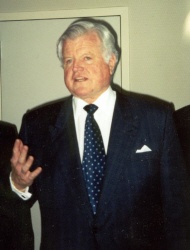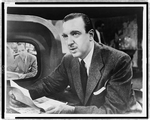Posted on August 28, 2005
Hagel & Jeckel
Chattering anti-war magpies
by
Daniel Clark
We're told by the Left that Cindy Sheehan, by virtue of her son's death in Iraq, has "absolute moral authority" to say whatever she wants without fear of criticism. Because of this, we're not supposed to reveal the stupidity of her statements, notice her habit of consorting with traitors, or point out that she's been lying. Okay, so I won't.

But that's no reason not to criticize Sheehan-like blatherings when they spill from the mouth of a Republican senator. After all, those same people who have made Cindy a cult hero enjoy few things better than a little GOP infighting. There's no need, then, to have any compunction about telling Sen. Chuck Hagel to shut his food hole.

The "moderate" Nebraska Republican has been critical of the U.S. war effort in Iraq from the very beginning. However, his recent remarks on ABC's This Week have brought him to the point that when he speaks, all you have to do is add the words "quagmire" and "addarat-nablaughuhminnahh," and you'd swear you were listening to Ted Kennedy instead. Despite the consistency of his cynicism, it is now being hailed by the media as a new development that is creating a rift within his own party, and validating of the antics of Mrs. Sheehan and her groupies.
Recent reports have referred to Hagel as a "leading" GOP senator, despite the fact that he holds no chairmanships above the subcommittee level. Apparently, they consider him to be one of the party's leaders because he is considering a run for the 2008 presidential nomination, although his prospects are so bleak that liberal Republicans must be pining for the glory days of the Specter '96 campaign.
If you don't see a lot of Republicans lining up behind this "leading" senator of theirs, perhaps it's because of comments like this one that he made to This Week's George Stephanopolous: "I think our involvement there [in Iraq] has destabilized the Middle East, and the longer we stay there, I think the further destabilization will occur."
Can you think of anything more redundant than "destabilizing" the Middle East? What are we going to do for an encore, drive Harry Belafonte nuts? The only way the Middle East can be said to have been stable before the war is from the viewpoint of dictators and Islamic terrorists. For Saddam Hussein and Abu Musab al-Zarqawi, the pre-war status quo must have felt very stable indeed.
Since the U.S.-led invasion of Iraq, most major events in the Middle East have been positive. Iraqis have held their first free elections in that nation's history. The Syrian army has withdrawn from Lebanon. Libya has begun dismantling its WMD program. Women have won the right to vote and run for office in Kuwait. Even the Saudis have held municipal elections, which, though largely symbolic, demonstrate the pressure they've felt from their own people to democratize. One would hope that a United States senator would view these developments as progress, but to Hagel, they're "destabilization."
Not only doesn't Hagel acknowledge these successes, but he even grouses that "now we are locked into a bogged-down problem not dissimilar to where we were in Vietnam." Perhaps the senator, himself a decorated Vietnam veteran, thinks that his distinguished war record adds credibility to Sen. Kennedy's delusion that "Iraq is George Bush's Vietnam." Instead, it makes that nonsensical claim all the more incomprehensible, since it is now coming from somebody who ought to know better.

This Iraq-Vietnam comparison has become such a tiresome mantra of the Left that its familiarity makes it easy to lose sight of just how bizarre it truly is. In order for the two conflicts to be comparable, we'd have to have "destabilized" Vietnam by capturing Ho Chi Minh, killing his right-hand men, systematically rounding up the other members of his regime, and helping the people of North Vietnam to establish their own representative government. In other words, Vietnam would have to be de-quagmired in order for it to resemble Iraq.
Just when you think Sen. Hagel can't drift any farther into this gloomy dreamworld of his, he tells Stephanopolous, "I think by any standard, when you analyze two and a half years in Iraq, where we have put in over a third of a trillion dollars, where we have lost almost 1,900 Americans, over 14,000 wounded, electricity production down, oil production down, any measurement, any standard you apply to this, we're not winning."

Really? By any standard? How about the fact that the terrorists' primary goal, to prevent the establishment of a representative government in Iraq, has to this point proven to be an utter failure? How about the fact that the Butcher of Baghdad has been reduced to playing the role of the melancholy poet, to try to score sympathy points with the Left while awaiting trial for his many atrocities? How about the fact that Saddam will no longer be negotiating arms deals with al-Qaeda, training terrorists to hijack planes at Salman Pak, bankrolling suicide bombings in Israel, or harboring some of the most notorious terrorists in the world? Next to these factors, "oil production down" hardly sounds like a valid criterion for determining victory or defeat.
In case you're wondering if there's something in particular about Iraq that's driving Hagel's pessimism, keep in mind what he had to say about another military action, in a speech he gave to the World Affairs Council on May 20, 2003. "Afghanistan has not gone as we had hoped. While the Taliban no longer rules, the government of President Hamid Karzai has gained little ground. Warlords, and those who may sympathize with al-Qaeda and extremists, still control much of the countryside. Afghanistan could descend into civil war, or perhaps a failed state, which would have grave consequences for stability in South and Central Asia." He went on to say that our success there depended on the support of "our allies," which he defined by throwing a couple rhetorical bones to France and Germany.
The media would have us believe that the mission in Iraq has just recently lost Hagel's support, because the war is going so badly that even the president's congressional allies are jumping ship. The truth is that he was never on board in the first place. He even suggested last year that we may need to institute a draft, a favorite cause among liberals trying to stir up anti-war sentiment. The timing of this statement, near the start of the presidential general election campaign, played right into the Democrats' tactic of warning young voters of Bush's "secret plan" to bring back the draft as soon as he was re-elected.
Since the outset of the war, Hagel has joined many liberals in ignoring our coalition partners, and warning that the United States cannot be successful in the War on Terror without "internationalizing" the effort by including "our allies." Now that we've pressed on with the real allies we already had, he has returned to say "I told you so" -- apparently oblivious to the fact that there's no "so" for him to have told us.

President Bush has already fought and won this campaign against John Kerry. For Chuck Hagel to come back with more of the same at this point does nothing to bolster Kerry's failed arguments. If it did, then it would have persuaded voters when both Kerry and John Edwards cited Hagel's carping in their debates with Bush and Cheney. Hagel had taken the Kerry-Edwards-France-Germany-U.N. position on the war then just as he does now.
Although he's portrayed as a disillusioned hawk, Hagel is just another chattering anti-war magpie. He's constantly giving his opinions on the war, which haven't changed much, nor do they significantly differ from those of other war critics. So there's really nothing newsworthy about them.
But then, Cindy Sheehan isn't newsworthy either. As is the case with Hagel, Sheehan's objection to the war has been a constant from the start. Nevertheless, her repetitive statements have made headlines on a daily basis. Hagel's and Sheehan's opinions are misrepresented as having been shaped by recent events, because they must fit into the broader theme that Americans are turning against the war. This is the media's self-fulfilling prophecy.

They gloat that the U.S. Army is failing to meet recruiting goals (which, as of this writing, is no longer true), without bothering to mention that the other branches of the service have met or exceeded their goals throughout the war. Then they juxtapose that item with sycophantic portrayals of war protesters in order to present both sides of their story -- that support for the war is waning, and that opposition to it is gaining strength.
Next come the speculative pieces, projecting timetables for withdrawal from Iraq. These run along two divergent story lines: (1) that our soldiers will be brought home abruptly, leaving the developing Iraqi government at the mercy of the enemy, thus proving the war a mistake; and (2) that the U.S. will continue to "occupy" Iraq for the foreseeable future, thereby vindicating the quagmire theorists.
Inevitably, some new polling results will reflect what people have been reading in the papers. The press reverses the causal relation, by using the data to justify their front-page editorials. The war in Iraq must be going badly, because at least 505 out of 1,009 respondents say so. Of course, it helps if the results are compromised to start with. A recent Gallup poll being reported as a rebuke of the war shows Bush's approval rating at an all-time low of 40 percent. Internals of the poll show that only 29 percent of respondents were Republicans, while 35 percent were Democrats -- not exactly an accurate reflection of a population that is evenly split between the two parties.
It's at this point that reporters set out to gather a fresh batch of vacuous quotes from the anti-war chatterers, without any concern for the accuracy of their content. As a result, the critics' opinions become the news, under headlines like, "Hagel likens Iraq to Vietnam," and, "Sheehan: Bush killed my son."
Now that all the pieces are in place, the media's war narrative becomes a vicious cycle, as one element of their story validates the others. A "leading GOP senator" says Iraq is like Vietnam, in part because there are conflicting reports about the expected duration of our presence there, which will cause concerns about our military's ability to recruit, and subsequently contribute to the pessimism among poll respondents.
America is not, as Sen. Hagel has charged, destabilizing the Middle East, but Hagel is definitely doing his part to destabilize America. It's high time a little destabilization was introduced to his own career, by some of those Republicans he's supposed to be leading.
The Shinbone: The Frontier of the Free Press
Mailbag . Issue Index . Politimals